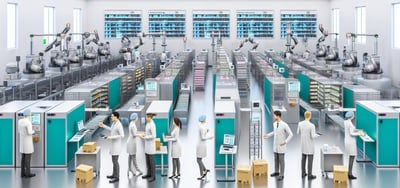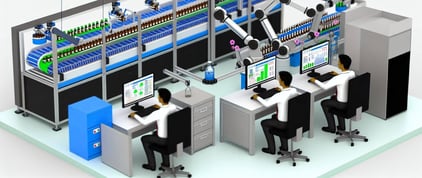Material Handling Optimization
Every aspect of the production process, from formulation to packaging, must be meticulously managed to ensure timely delivery of life-saving medications. At the heart of this intricate dance lies material handling optimization—a critical component that can make or break operational success.
As a Production Scheduler in a pharmaceutical manufacturing facility, you understand the challenges of orchestrating the flow of materials amidst strict regulatory requirements, fluctuating demand, and the need for cost-effectiveness.
In this blog, we'll look into the realm of material handling optimization, exploring strategies, technologies, and the crucial integration between production scheduling software like PlanetTogether and enterprise resource planning (ERP), supply chain management (SCM), and manufacturing execution systems (MES) such as SAP, Oracle, Microsoft, Kinaxis, Aveva, and others.

The Significance of Material Handling Optimization
Material handling encompasses the movement, storage, control, and protection of materials throughout the manufacturing process. Optimization in this domain entails streamlining these activities to minimize waste, reduce costs, improve throughput, and enhance overall productivity. In the pharmaceutical industry, where precision and compliance are non-negotiable, efficient material handling can significantly impact operational efficiency and ultimately, patient outcomes.
Key Challenges in Pharmaceutical Material Handling
Regulatory Compliance: Pharmaceutical manufacturers operate within a highly regulated environment, requiring strict adherence to Good Manufacturing Practices (GMP) and other regulatory standards. Any deviation in material handling procedures can result in compliance issues, product recalls, and reputational damage.
Product Variability: With a diverse range of products in various formulations and packaging configurations, handling materials efficiently becomes inherently complex. Batch sizes, expiration dates, and storage requirements further compound the challenge.
Demand Fluctuations: Market demands for pharmaceuticals can be unpredictable, necessitating agile production planning and material handling strategies to respond effectively to fluctuations in demand while avoiding excess inventory or stockouts.
Traceability and Serialization: Traceability is crucial in pharmaceutical manufacturing to ensure product quality and safety. Material handling optimization must incorporate robust serialization and tracking mechanisms to trace materials throughout the supply chain accurately.

Strategies for Material Handling Optimization
Lean Principles: Embrace lean manufacturing principles to eliminate waste and streamline material flow. Techniques such as 5S (Sort, Set in order, Shine, Standardize, Sustain), Kanban, and value stream mapping can help identify inefficiencies and optimize material handling processes.
Automated Material Handling Systems: Implement automated systems for material movement, storage, and retrieval to reduce manual handling, minimize errors, and improve efficiency. Automated guided vehicles (AGVs), robotic palletizers, and conveyor systems can significantly enhance material handling operations.
Just-in-Time (JIT) Inventory Management: Adopt JIT inventory management practices to synchronize material flow with production requirements. By replenishing materials precisely when needed, JIT minimizes inventory carrying costs and reduces the risk of obsolescence.
Cross-Docking and Direct-to-Line Delivery: Streamline material flow by bypassing intermediate storage locations and delivering materials directly to the production line (cross-docking). This approach minimizes handling and storage time, optimizing overall throughput.
Advanced Planning and Scheduling (APS): Leverage sophisticated production scheduling software like PlanetTogether to optimize material handling activities. APS solutions consider various constraints, such as resource availability, lead times, and production sequences, to generate optimal production schedules that minimize material handling disruptions.

Integration between PlanetTogether and ERP, SCM, and MES Systems
The seamless integration between production scheduling software like PlanetTogether and ERP, SCM, and MES systems is pivotal for effective material handling optimization. Here's how this integration enhances operational efficiency:
Real-Time Data Exchange: Integration allows for the seamless exchange of real-time data between production scheduling, ERP, SCM, and MES systems. This ensures that production schedules are based on accurate inventory levels, demand forecasts, and resource availability, minimizing the risk of disruptions in material handling.
Visibility and Transparency: Production schedulers gain comprehensive visibility into the entire supply chain—from raw material procurement to finished product distribution—enabling proactive decision-making and effective resource allocation.
Optimized Resource Utilization: Integration enables optimized resource utilization by synchronizing production schedules with material availability and production capacity. This ensures that materials are allocated efficiently, minimizing idle time and maximizing throughput.
Improved Traceability and Compliance: Integrated systems facilitate seamless traceability and compliance management by capturing and documenting critical data at every stage of the production process. This enhances regulatory compliance and simplifies auditing and recall procedures.
Enhanced Collaboration: Integration fosters collaboration across departments by providing stakeholders with access to real-time information and actionable insights. This promotes cross-functional alignment and enables proactive problem-solving to address material handling challenges swiftly.
In pharmaceutical manufacturing, material handling optimization is not merely a luxury but a necessity for sustained success. By implementing strategies such as lean principles, automated material handling systems, JIT inventory management, and advanced planning and scheduling, pharmaceutical manufacturers can streamline material flow, reduce costs, and enhance operational efficiency.
Furthermore, the integration between production scheduling software like PlanetTogether and ERP, SCM, and MES systems serves as a linchpin in this optimization journey, facilitating real-time data exchange, enhancing visibility and transparency, optimizing resource utilization, ensuring compliance, and fostering collaboration across the organization.
As a Production Scheduler, embracing material handling optimization and leveraging the power of integrated technology solutions are key to navigating the complexities of pharmaceutical manufacturing with agility, efficiency, and precision. By continuously refining material handling processes and embracing innovation, pharmaceutical manufacturers can unlock new levels of efficiency and maintain their competitive edge in an ever-evolving industry landscape.
Are you ready to take your manufacturing operations to the next level? Contact us today to learn more about how PlanetTogether can help you achieve your goals and drive success in your industry.